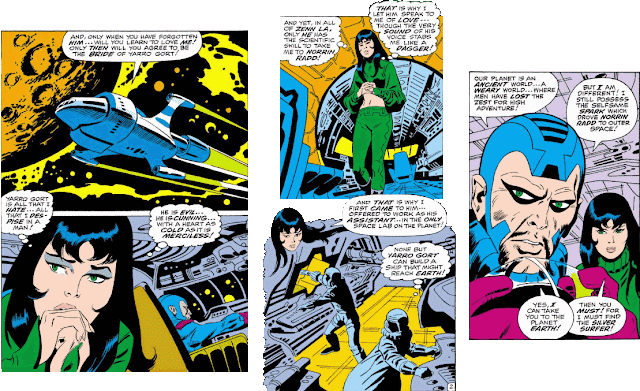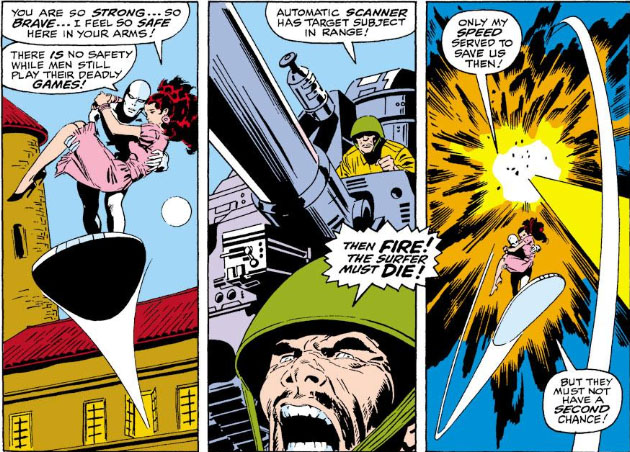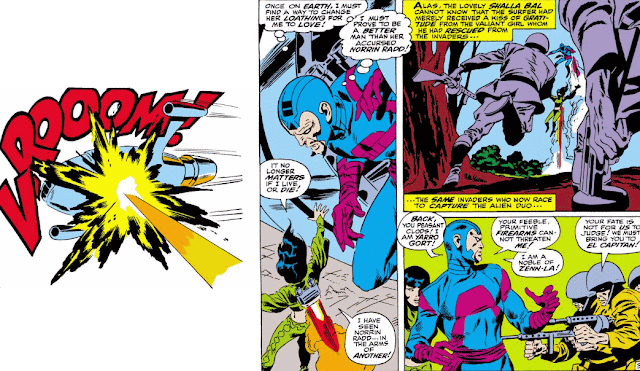As frequently as Shalla Bal, the beloved of the tragic Silver Surfer, finds herself traveling to Earth to be used as a pawn in some scheme against the sky-rider, she should consider investing in a time-share--except that her visits invariably end with her being sent back to her planet, Zenn-La, leaving the Surfer a heartsick wreck at the unfairness of it all. But in a two-part Silver Surfer story from late 1969, it's Shalla Bal who takes the initiative this time in making the journey to Earth--while the Surfer struggles to understand the driving force behind the savage and hostile behavior of the humans with whom he must share this world.
The last we saw Shalla Bal, she had been brought to Earth by Mephisto in order to provide the demon with leverage to gain possession of the Surfer's soul--though after the failure of that scheme and following her return to her own world, she's been provided with cameo appearances in succeeding stories, as she continues to pine for the Surfer while spurning any other suitors for her hand. Apparently Shalla Bal is highly regarded and sought after on Zenn-La, as often as the populace take note of her sorrow and remark with pity that such a woman chooses to carry this burden of the heart. Had Mephisto not made her aware of the Surfer's fate on Earth, she might have indeed moved on with her life; but now, knowing that the Surfer no longer travels the galaxies with Galactus and is trapped on an alien world, she can only pace with uncertainty and helplessness at her inability to reach out to the one she still loves.
Obviously, from the issue's splash page, she's moved from uncertainty to taking deliberate steps toward rejoining the Surfer--becoming close to Yarro Gort, a scientist who (like everyone else on Zenn-La, it seems) would like nothing more than to claim Shalla Bal as his own and is gambling on the fact that the Surfer has likely met his end on Earth at the hands of the unreasoning humans who live there. To get what they want, both Shalla Bal and Yarro Gort are playing each other, though it's only Gort who lays his cards on the table in wanting to become Shalla Bal's betrothed; the surprise is really what we see in Shalla Bal's behavior. By her own admission, Gort is despicable and no one she would ever care to be with--yet, while making no promises, she leaves the door open for Gort after seeking him out, giving him the impression that her love for the Surfer can be considered conditional. Her methods in gaining Gort's help are rather unscrupulous--so much so that Gort hedges his bets by insisting that a bargain be struck between them.
Of course, encountering so blatant an agreement this early in a story practically guarantees that its terms will be met at some point later--though as much as he shuns humans, it's hard to imagine circumstances where the Surfer would find himself falling for an Earth woman in the time it takes Shalla Bal and Gort to make the journey from Zenn-La. We'll have to wait and see.
Meanwhile, the Surfer has decided to readopt the "Joe Cool" disguise that he first made use of to walk among humans incognito, this time in order to make an effort to understand why the human race is so driven by violence. There isn't any one place that he settles on as his destination, but he makes a reasonable deduction as to what kind of environment to begin in.
Landing in a South American town that has been occupied by an army of an unnamed general and his unnamed captain, writer Stan Lee perhaps feels no need to assign more than generalized identities to either the people we'll meet or even the town itself--and, indeed, giving them no identity makes no real difference. The point being made is that there is little to no reason for the hostilities taking place around the Surfer, and that would hold true for practically any such place the Surfer would have come to. Nor does the Surfer have to wait long for the senseless acts of the "occupying army," as Lee refers to them, to be made apparent.
The Surfer's actions against these oppressors result in him being befriended by the building's occupants, a young woman named Donna Maria and her mother. So far, the Surfer doesn't seem hopeful that his experience here will offer any sort of clarity for him--though how interesting that one so oppressed as the Surfer has come to a land where humans also are suffering such treatment, from each other. Had he been able to retain his anonymity, it would be the perfect learning opportunity for him.
The wave of despondency that washes over the Surfer, and the fact that his many questions on the irrationality of human nature appear to have no answers whatsoever, resonate powerfully in light of the surroundings that Lee has placed him in, while the images that artist John Buscema provide of the Surfer in these close quarters give a more genuine feel to the Surfer's frustration than might have been possible if such musings had been made from the Surfer's vantage point in orbit. Though it bears mentioning that it's no wonder that the Surfer is finding no answers; the questions being posed are after all meant for the reader to hear and ponder. (In fact, the Surfer's comments while lying in his attic bed--a striking image from Buscema, particularly while still dressed in his human garb--may be the most pointed that Lee has been on the subject since the book's inception.)
Seeking the intruder that had confronted his men in the streets, the Captain decides to have Donna Maria taken into custody for the General, prompting the Surfer to come looking for her at the army's headquarters. The forces stationed there give him the reception you'd expect--at which point the Surfer decides to retire "Joe Cool" and take a more offensive posture in dealing with these attackers.
To see the Surfer lashing out in this manner shines a harsh light on the many instances where he berates humans about responding to force with force, to violence with violence. Consider his earlier anguished comments in this very story: "...their history has taught that none ever profit from violence... and the wages of warfare are death! And yet they persist... and still they continue! But why? Why? WHY?" Lee at least has the good sense to later have the Surfer recognize that he appears to be becoming just like us in that respect--yet that's an observation rather than an answer. How often has the Surfer failed his own litmus test in the run of this book? How often has he lashed out with his own power in response to the violence he abhors? And why did Lee look the other way each time?
Meanwhile, the ship of Gort and Shalla Bal has entered Earth's atmosphere, and even now closes in on the Surfer's position. The timing of their arrival, as it happens, coincides with Part 1 of this story drawing to a close--and with a grateful Donna Maria now being whisked from the scene by her rescuer, you can imagine the sight that the ship's viewer picks up when it comes within range, as well as the elation of Gort at its revelation.
As Part 2 opens, the tatters of the General's forces see a new danger in the form of Gort's approaching ship, one that replaces the departing Silver Surfer as a threat to their tenacious grip on this land. We never do learn why this town is so important to the occupying forces; presumably Lee wants to focus the reader's attention on the senselessness of conquest and seizing power, when, as he has the Surfer observe, the Earth is a paradise for all. But, scheming though Gort is, he, too, falls victim to the warring of Earthlings, though he's quick to take sides since the Surfer's presence represents a threat to his plans for Shalla Bal.
As for the Surfer, he's taken notice of the now-abandoned spacecraft that now hurtles toward crashing into the village and takes steps toward extinguishing its flames and landing it safely. And as he investigates, what he discovers of its origin is an eye-opener, to say the least.
Returning Donna Maria to her home, the Surfer seeks information on the ship from her compatriots in the Underground, who now find their forces severely diminished from their engagements with the General's more well-armed troops. They have little information on the ship's pilot, other than the fact that he appears to be plotting with the General in secret; but just then, the enemy forces burst in, intent on taking down the Underground once and for all. But one stands in their way--and not just in their way, as Lee seems to have decided to stop looking the other way and instead have the Surfer face the implications of his own actions.
Stinging, and judgmental, words from the Surfer, as he appears to abandon this land's plight altogether--and perhaps he would, if it were not for the unresolved situation with the Zenn-La craft and its occupant(s). Even now, Gort prepares for an encounter with the Surfer by promising the General advanced weaponry which will deal with the sky-rider. Neither side trusts the other, with both Gort and the General only playing for time until they each get what they want. (Sound familiar?) Shalla Bal, for her part, announces that she will agree to be wed to Gort, if the Surfer is not harmed. Yet the General covets the lovely alien woman, forcing Gort to make it clear that he will turn his weaponry on the General and his men if he's crossed.
Gort's point made, the compound is then rocked with mortar fire, as the remnants of the Underground attack. Following the General's demands (at least for now), Gort begins laying down fire--but with the return of the Surfer, he quickly recognizes the more important target.
With the Surfer having survived his initial strike, Gort turns to bring into play heavier weaponry; but Shalla Bal leaps to save the one she loves, and it's apparent to Gort that it isn't himself. Unfortunately, her interference is unacceptable to the Captain of the army--and his actions set in motion a chain of events which will not only put an end to the occupation, but to the plans of the one who put Shalla Bal in harm's way.
Their leaders dead, the army surrenders to the Underground, a victory which recedes into the background as the Surfer's reunion with Shalla Bal becomes all too brief in light of her critical condition. And though we would see other instances of the Surfer's power restoring to health those who were afflicted with similar injuries or worse, Lee would choose a more expedient way to close this story that would eliminate any loose ends.
Don't trouble yourself, I can probably guess what's going through your mind: Wounds too severe for even cosmic power to treat, yet apparently not so severe that this woman can survive an interstellar trip to another planet, alone and untended. And why not just leave Gort behind on Zenn-La, if the ship can be programmed to make the trip to Earth?
Perhaps the greater item of interest to take away from this story, however, is not what the Surfer has observed here of the irrationality of humans, which we've often been a captive audience to in one way or another, but the seed being planted for the Surfer's growing tendency to fight fire with fire, violence with violence--to push back when pushed, to meet insanity and aggression with conviction and the use of force. The Surfer makes a valid point that such actions have only resulted in uneasy truces in favor of the victor and never a lasting peace for the human race as a whole; yet he's now discovering that turning the other cheek isn't a solution, either. Regrettably, there wasn't time in this series to explore this growing conflict within him; but with the final issue of the series, we at least received a preview of what was possibly to come of it.
 | The Silver Surfer #s 10-11 Script: Stan Lee Pencils: John Buscema Inks: Dan Adkins Letterer: Sam Rosen |


























3 comments:
When we first met the Surfer in Fantastic Four he had supposedly been the herald of Galactus for eons, his name spoken in dread whispers across the cosmos blah, blah - but given the fact that Shalla-Bal hadn't aged at all since the Surfer's departure from Zenn-La it seems that he'd actually been Galactus' herald for maybe a couple of years at most ! How much more poignant it would have been if Shalla-Bal had just been a distant memory for the Surfer, somebody who had died thousands of years before.
Excellent point, Colin. Lee's take on the Surfer was not the same as Jack's, causing a rift between the two that precipitated Jack's going to DC. Jack had a completely different notion of who and what the Surfer should be. Lee used him as a mouthpiece for his pseudo-Shakespearian babbling, which I believe lead to the books demise. As a teenaged reader, though, I certainly appreciated Shalla Bal's midriff-baring outfit.
Colin, I think you may be mistaking the Surfer for his former master--it's probably Galactus everyone was speaking about in whispers, the one who's been around for eons. The Surfer probably has enough of a guilty conscience, considering the number of worlds he led Galactus to while he was his herald--think how he might have felt if he'd been dooming planets for a billion years or so!
That said, I really like your alternate interpretation for how he'd regard Shalla Bal--though that might open up a whole new can of worms, since the Surfer would have long since mourned her loss and wouldn't be moaning about her constantly while trapped on Earth. (Which I think I could live with.)
Post a Comment